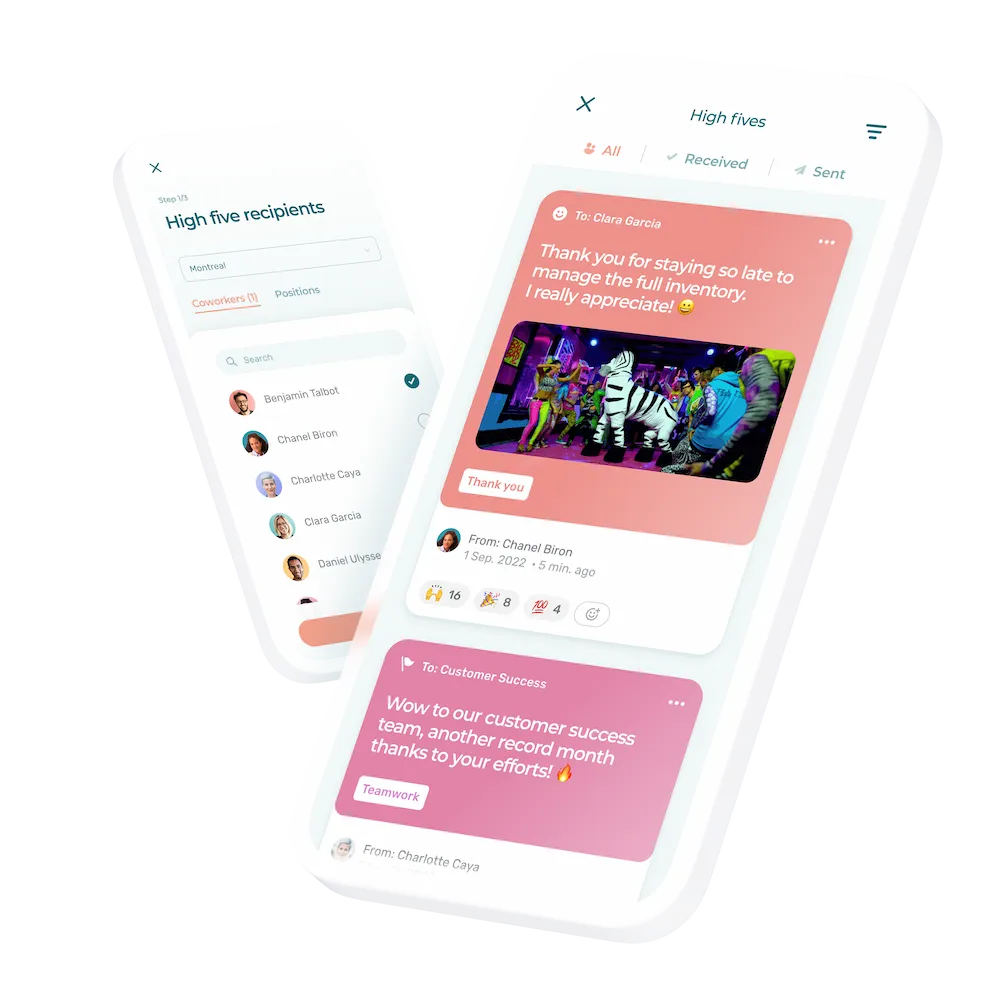Employees’ sense of belonging is a powerful source of motivation that’s underestimated by some employers.
But what is it exactly? Belonging refers to an employee’s feeling of attachment and recognition toward their employer. It helps develop employees’ loyalty in addition to boosting their productivity.
When employees have a strong sense of belonging at work, they even become ambassadors and positively represent the company that employs them. All this, without anyone even asking them to do so.
According to a study by Deloitte, 93% of employees believe that belonging improves their performance at work.
However, belonging can’t be created at the snap of a finger. It can take a long time to develop and to deliver tangible results. Above all, keep in mind that your approach must be authentic and rooted in your company’s values in order to really work.
Let’s look at why all companies should take the time to cultivate a sense of belonging in their employees.
The Benefits of Cultivating Belonging at Your Company
According to an American study, sense of belonging at work has multiple benefits, such as:
- Enhancing employee performance by 56%
- Diminishing the risk of employee turnover by 50%
- Bringing down the number of employee sick days by 75%
If your team members have a strong sense of belonging to your organization, they will be not only more productive, but more committed to the company’s success. They won’t hesitate to put in some extra work when necessary and to recommend you as an employer.
A sense of belonging will increase a company’s retention rate and improve employee loyalty.
The fact is that you have everything to gain by making your team members feel like they belong.
How to Develop Sense of Belonging at a Company
There are countless ways to develop a sense of belonging in your employees. And no one recipe is necessarily better than any another.
However, there are 4 criteria to meet to have a sustainable strategy. Whatever you choose to do, your employees must:
- Feel recognized
- Feel heard
- Feel involved
- Feel connected
Here’s how to make it happen. 👇🏻
1. Recognize Employees’ Work
To have a continued sense of belonging, your employees need to feel that their work is appropriately valued. For you, this means saying thank you more often and recognizing their achievements.
If your team just had a particularly busy night at the restaurant, take the time to thank them for their work, even if you’re busy.
Remember to give credit to your team members. They will feel that they are important and that their work is instrumental to the company’s success.
Be Flexible and Trusting
One of the best forms of recognition is to trust your employees. No one thrives or enjoys what they do when they’re constantly scrutinized by their manager. Encourage your employees to take initiative and give them the tools to do so.
Offer greater flexibility to show that you understand that they have a life outside of work as well. You can offer rotating schedules, a flexible vacation policy, or the opportunity to change their availability as often as they like. Make sure to use a professional communication tool to get in touch, rather than Facebook Messenger or Instagram—this way, they can unplug when they’re away from work.
Your staff management style also has a direct bearing on your employees’ sense of belonging.
For example, requiring a doctor’s note for absences is outdated. Instead, trust your employees and have a plan B. Use staff management software to send a notification to all your available employees in order to find a replacement in a few clicks if you need to.
Offer Skill-Development Opportunities
Help your employees develop their skills with training that will advance their careers. Consider offering more internal promotions and more training to employees who want to upgrade their skills.
This will not only directly boost your team’s motivation, but provide you with higher-trained, more competent employees who will be able to better serve your customers.
Supporting your employees’ professional development shows that you recognize their good work.
2. Give Your Team Members the Floor
The important thing isn’t just to listen to employees at team meetings but also to give them opportunities to express themselves.
For example, take the time to check in with your employees before introducing changes in your business. After all, they are probably in a very good position to make suggestions.
Be transparent and honest in your communications. Your employees will feel much more involved in decisions if their opinions have been heard. Don’t hesitate to use surveys for this purpose.
Here are some ideas for creating a culture that emphasizes listening and sharing between employees and managers:
- Take the time to have lunch with your team members.
- Get into the habit of holding anonymous surveys on various topics (management practices, job satisfaction, sense of recognition, etc.).
- Set up a feedback loop to explain your decisions and provide feedback to your employees.
- Get personally involved and help out your employees when needed.
3. Make Employees’ Work Meaningful
A clear vision is the foundation of belonging. How can your employees feel a sense of attachment and recognition if they don’t even understand your company’s mission and values?
Clarify the team’s goals as well as your mission and values. Take the time to spell all this out, and do so as many times as necessary. Don’t hesitate to reiterate your mission and values regularly so that your employees understand the purpose of their work.
Also be sure to introduce your mission and values during new employee onboarding. Set yourself up with the right onboarding tools to successfully welcome every new hire. This way, they can develop a sense of belonging much faster.
Demonstrate Leadership
You know what they say—employees don’t leave companies… they leave their managers.
Apply management practices that allow your employees to thrive at work. Avoid micromanaging; instead, set an example for your employees. An inspiring leader will be able to rally their team around common goals.
The more united your team is around clear objectives, the faster you will achieve them.
💡Work on your emotional intelligence to become a better leader.
4. Connect Your Team Members
Team cohesion is a very important piece of the puzzle when it comes to belonging.
If your team isn’t tight-knit, your employees won’t really feel like they belong.
Fortunately, there are a plethora of ways to help your team members connect.
For example, you can organize team-building activities on a regular basis. One easy way to do so is yearly celebrations, such as a Christmas party or an end-of-season party for seasonal jobs. You’ll be able to thank your employees for their hard work and forge a tradition that will strengthen the bonds between all team members.
Also, make sure your employees enjoy the activities by sending out a satisfaction survey.
Be sure to create an attractive corporate culture. This will make your company a great place to work and make your recruitment efforts easier.
Whatever initiatives you put in place, take the time to show interest in your employees. Don’t hesitate to ask them questions to get to know them better.
Employee Experience Is the Key to Your Success
If you treat your employees well, they are sure to return the favour. And they will develop a sense of belonging to your organization. The positive ripple-effect for your employer brand will be fabulous.
Focus on your team members’ satisfaction and apply person-centred management methods that would make any worker jealous. Be the kind of boss you wish you had.











